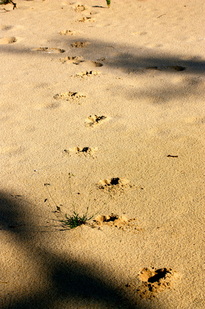Living with Cougars in Michigan
|
Although many people believe our last cougar was killed in the early 1900's, recent evidence proves that Michigan Cougar have survived, at least in small numbers. Michigan Wildlife Conservancy researchers have found cougar DNA in scat (feces) from eight counties: Dickinson, Menominee, Delta, Emmet, Presque Isle, Alcona, Roscommon, and Houghton. The conservancy also has documented evidence of cougars from several other sites, including tracks, photos, videotape, and sightings by researchers.
Cougars usually live in areas with plentiful deer and adequate cover - which can include subdivisions and urban fringes. The more we humans invade cougar territory, the greater the chance of human/cougar interactions. - Habitats and Habits -We can live with cougars if we respect them, their habitat and their habits.
|
How to Reduce Risk Around Your Home -
- Make lots of noise if you come and go during the times cougars are most active - dusk to dawn.
- Install outside lighting.
- Watch children when they play outdoors. Keep them inside between dusk and dawn.
- Keep your eye on your pets and keep them inside at night or in a kennel with a secure top. Don't feed pets outside, it attracts prey animals.
- Store all garbage securely so you won't attract raccoons and other animals that cougars eat.
- Don't feed wildlife. Predators follow prey.
- Place livestock in enclosed sheds or barns at night. Close doors to outbuildings since inquisitive cougars may go inside for a look.
- Recognizing a Cougar -
 Cougar tracks in sand
Cougar tracks in sand
SIZE 80 to 200 pounds; 7 to 9 feet from nose to tip of tail
APPEARANCE Usually tan or brown with a very long tail
BEHAVIOR Cougars are usually solitary, except for mothers with young.
TERRITORY Individual cougars may occupy a territory as large as 10 miles by 20 miles. Females usually
settle near their mothers.
ROAMING Young males may travel over 200 miles in search of their own territories.
FOOD White-tailed deer are the chief prey of cougars in Michigan, but the cat will feed on beaver, rabbits, birds, porcupines, coyotes, bobcats, and other smaller animals, and occasionally even fish and frogs.
OTHER NAMES Mountain lion, puma, panther, catamount
APPEARANCE Usually tan or brown with a very long tail
BEHAVIOR Cougars are usually solitary, except for mothers with young.
TERRITORY Individual cougars may occupy a territory as large as 10 miles by 20 miles. Females usually
settle near their mothers.
ROAMING Young males may travel over 200 miles in search of their own territories.
FOOD White-tailed deer are the chief prey of cougars in Michigan, but the cat will feed on beaver, rabbits, birds, porcupines, coyotes, bobcats, and other smaller animals, and occasionally even fish and frogs.
OTHER NAMES Mountain lion, puma, panther, catamount
- Signs of a Cougar -
SCAT Cougar scats are large, usually more than one inch in diameter and highly segmented. They typically contain deer hair. They may be covered with dirt or leaves.
TRACKS Each track is 3-4 inches in diameter, with four toe prints around a lobed pad. Nails are retractable and usually do not show in print.
PREY CARCASSES If an animal has been killed by a cougar, there will be bite marks on the top or back of the head or neck or the throat. Cougars often carry or drag their kill some distance and may scrape soil or forest litter over it.
TRACKS Each track is 3-4 inches in diameter, with four toe prints around a lobed pad. Nails are retractable and usually do not show in print.
PREY CARCASSES If an animal has been killed by a cougar, there will be bite marks on the top or back of the head or neck or the throat. Cougars often carry or drag their kill some distance and may scrape soil or forest litter over it.
- Cougar Encounters -
Your chances of encountering a cougar are slim, but...
You will probably never see a cougar, even from a distance, let alone encounter one up close. Cougar attacks on humans are even less likely. Dogs kill 18 people in the U.S. every year, but in the last 113 years, cougars have killed only 13 people in North America. So take precautions, but don't be overly concerned.
Here are some suggestions to increase your personal safety -
You will probably never see a cougar, even from a distance, let alone encounter one up close. Cougar attacks on humans are even less likely. Dogs kill 18 people in the U.S. every year, but in the last 113 years, cougars have killed only 13 people in North America. So take precautions, but don't be overly concerned.
Here are some suggestions to increase your personal safety -
- Hike in groups and make noise to avoid surprising a cougar. Carry a sturdy walking stick.
- Don't jog alone. Carry a whistle, noisemaker, and perhaps some mace. Jogging with a dog might actually be more likely to trigger an attack. Cougars may see dogs as prey, rather than a threat.
- Face the cougar and stand upright. Avoid bending over to pick up a gun or stick.
- Try to appear larger. Raise your arms. Open your jacket.
- Keep children close to you and pick them up if you see a cougar. Tell them NOT to run.
- Do not approach a cougar, especially one feeding or with kittens. Most cougars will try to avoid a confrontation. Give them a way to escape.
- Do not assume that a fearless cougar is a pet!
- Stop. Back away slowly. Running may stimulate the cougar's instinct to chase and attack.
- If the cougar approaches you, throw stones, branches, or anything you can get without crouching or turning your back. Wave your arms slowly and speak firmly. Try to convince the cougar you are not prey and that you may in fact be a danger to it.
- Fight back! People have successfully warded off attacks with rocks, sticks, caps, jackets, garden tools and their bare hands. Remain standing or try to get back up.
- Cougars, an Endangered Species -
You may never see a cougar, but isn't it exciting to know they exist?
Cougars are an important part of our wildlife heritage. Cougars are protected under the state Endangered Species Act and cannot be harmed except to protect human life or - by permit only - to protect livestock.
How You Can Help -
1. Learn more about the cougar. Read The Cougar In Michigan: Sightings And Related Information, available by calling 517-641-7677.
2. Educate your neighbors. Encourage them to follow the precautions outlined on this website.
3. Be a citizen researcher to help wildlife biologists learn more about Michigan's cougars, so we can better protect and manage them. Order the field guide Detecting Cougars In The Great Lakes Region or attend a training session. Join the Cougar Trackers and receive free e-mail news about cougars.
4. Report signs of cougars. Call the Michigan Wildlife Conservancy at (517-641-7677) and fill out an investigation report.
5. Contribute to the Michigan Cougar Protection Fund to make possible the DNA analysis necessary to study and protect cougars, and to educate people and prevent human/cougar problems. Donations are tax-deductible.
Cougars are an important part of our wildlife heritage. Cougars are protected under the state Endangered Species Act and cannot be harmed except to protect human life or - by permit only - to protect livestock.
How You Can Help -
1. Learn more about the cougar. Read The Cougar In Michigan: Sightings And Related Information, available by calling 517-641-7677.
2. Educate your neighbors. Encourage them to follow the precautions outlined on this website.
3. Be a citizen researcher to help wildlife biologists learn more about Michigan's cougars, so we can better protect and manage them. Order the field guide Detecting Cougars In The Great Lakes Region or attend a training session. Join the Cougar Trackers and receive free e-mail news about cougars.
4. Report signs of cougars. Call the Michigan Wildlife Conservancy at (517-641-7677) and fill out an investigation report.
5. Contribute to the Michigan Cougar Protection Fund to make possible the DNA analysis necessary to study and protect cougars, and to educate people and prevent human/cougar problems. Donations are tax-deductible.

